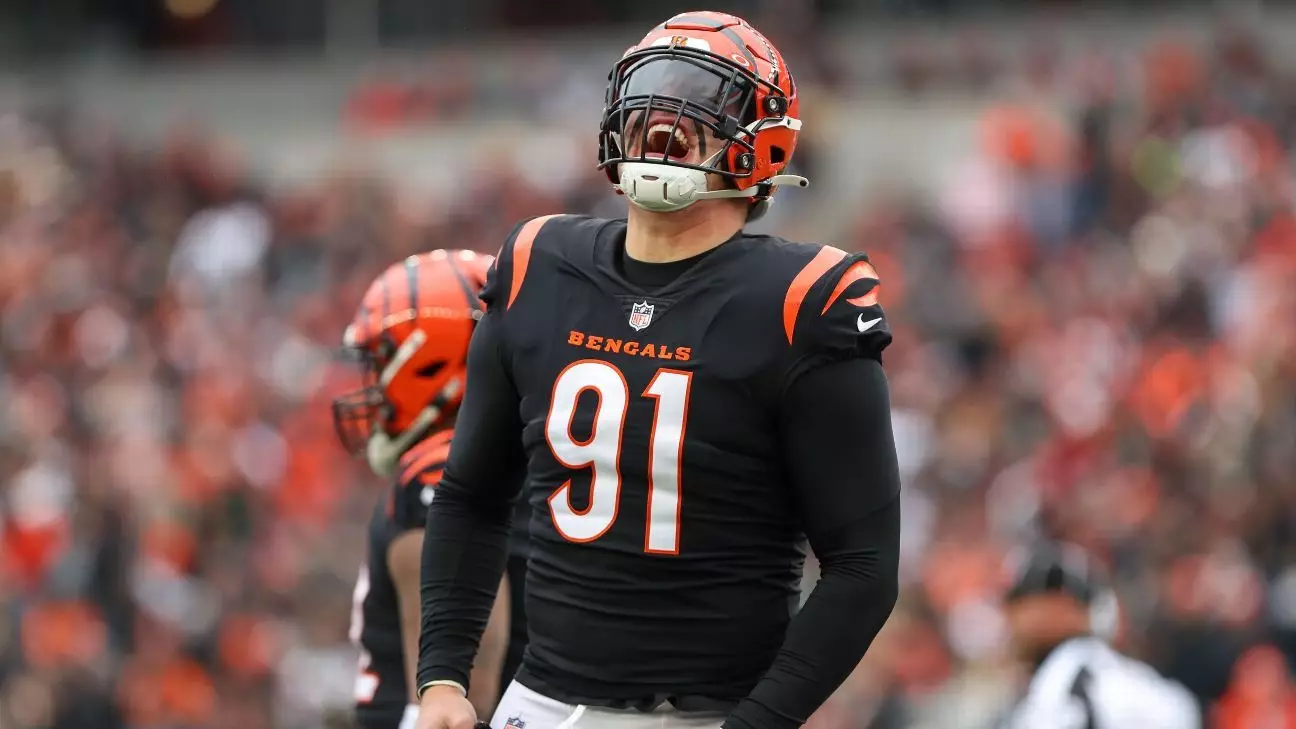Trey Hendrickson’s recent move to seek a trade from the Cincinnati Bengals isn’t merely a personnel decision; it’s a reflection of deep-rooted issues within one of the NFL’s more promising franchises. The defensive end, who has carved out an impressive niche as a top-tier pass rusher, felt compelled to take this drastic step for the second consecutive year. While this may paint a picture of dissatisfaction, it underscores a broader narrative: sometimes loyalty comes at a price, and that price can be the chance for personal and professional growth.
Hendrickson’s statement revealed a complex emotional tapestry woven with gratitude yet shadowed by a yearning for opportunity. He called his time in Cincinnati an “honor and a privilege,” a sentiment that seems sincere but also highlights the frictions that exist between player aspirations and organizational constraints. In echoing his love for Cincinnati, one can’t help but notice the slight undertone of melancholy; it’s a love tinged with the weight of unfulfilled promise.
The Timing and Its Implications
Timing is everything in sports, and Hendrickson’s trade request couldn’t come at a more telling moment in the NFL landscape. Just days after the Raiders’ Maxx Crosby secured a staggering three-year extension worth $35.5 million annually, Hendrickson must be acutely aware of the stark contrasts in contract dynamics among elite players. His quote, “If it’s something that helps the Bengals win the Super Bowl, I want to help win a Super Bowl for Cincinnati,” subtly hints at a player weighing his priorities. Is it truly about winning, or has the lag in contract discussions left him feeling undervalued?
It’s worth noting that Hendrickson is not alone in his plight. He joins fellow franchise players like Ja’Marr Chase and Tee Higgins, both of whom are tangled in the web of contract negotiations. Their aspirations amplify the fractures within the organization, suggesting that Cincinnati’s front office may be out of touch with its players’ market value. Meanwhile, the decision not to offer Hendrickson a more lucrative long-term deal could indicate a reluctance to allocate financial resources effectively, a move that could be detrimental to the team’s competitive edge.
The Market for Defensive Stars
As the dust settles from Hendrickson’s request, the NFL landscape raises questions about the market for defensive players. Edge rushers in particular are increasingly seen as pivotal assets, capable of swinging games with momentum-shifting plays. With Hendrickson sitting at the helm of the best sack numbers in the league—17.5 sacks last season—it’s clear he commands attention. However, despite his on-field performance, he finds himself ranked 11th in average annual salary among his peers.
This disparity invites scrutiny over how teams value their defensive stars. Organizations must ask themselves: are they paying these elite players their worth? Not only do undervalued players risk showing discontent through trade requests, but it also becomes an ethical question of whether financial disparities reflect the intrinsic value these athletes bring to their respective teams.
A Broader Reflection on Loyalty and Value
In a league characterized by tough negotiations and player movement, Hendrickson’s trade request serves as a critical reminder of the business side of football. While players like Hendrickson may display loyalty to their franchises, the financial realities often dictate a different narrative. For every quote about love for a city or organization, there exists a contrasting viewpoint that highlights the commodification of athletes.
The interplay between loyalty and self-worth in professional sports is ultimately a microcosm of wider societal shifts. Players are increasingly unwilling to sacrifice their worth for the sake of nostalgia or attachment. This mentality enables them to chase not only higher paychecks but also the chance at sustained success—an understanding that transcends geographical loyalties.
As Cincinnati grapples with Hendrickson’s departure, it raises the question: are teams truly doing enough to honor the contributions of their players? The NFL, while a spectacle of athletic prowess, is also a platform for critical dialogues about capitalism, valuation, and the repercussions of choices made in the corporate boardrooms of franchises.


Leave a Reply